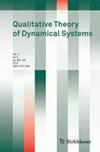半线性分数随机演化方程的近似可控性
IF 2.1
3区 数学
Q1 MATHEMATICS
引用次数: 0
摘要
本文证明了抽象空间中一类具有黎曼-刘维尔分数导数的半线性分数随机系统的近似可控性。证明的关键是所提问题存在温和解。这些结果基于从属性原理、紧凑半群和 Schauder 定点定理获得的算子新特性。在此,我们利用 Arzelà-Ascoli 定理获得了解算子的紧凑性。作为应用,我们建立了广义二级流体随机雷利-斯托克斯问题的近似可控性。本文章由计算机程序翻译,如有差异,请以英文原文为准。
Approximate Controllability for Semilinear Fractional Stochastic Evolution Equations
In this paper, we show the approximate controllability for a class of semilinear fractional stochastic systems in abstract space with the Riemann–Liouville fractional derivative. The key of the proof is the existence of the mild solution for the proposed problem. These results are based on new properties of the operator obtained by the subordination principle, compact semigroup and Schauder fixed point theorem. Here we obtain the compactness of the solution operator by using Arzelà–Ascoli theorem. As an application, we establish the approximate controllability of the stochastic Rayleigh–Stokes problem for a generalized second grade fluid.
求助全文
通过发布文献求助,成功后即可免费获取论文全文。
去求助
来源期刊

Qualitative Theory of Dynamical Systems
MATHEMATICS, APPLIED-MATHEMATICS
CiteScore
2.50
自引率
14.30%
发文量
130
期刊介绍:
Qualitative Theory of Dynamical Systems (QTDS) publishes high-quality peer-reviewed research articles on the theory and applications of discrete and continuous dynamical systems. The journal addresses mathematicians as well as engineers, physicists, and other scientists who use dynamical systems as valuable research tools. The journal is not interested in numerical results, except if these illustrate theoretical results previously proved.
 求助内容:
求助内容: 应助结果提醒方式:
应助结果提醒方式:


